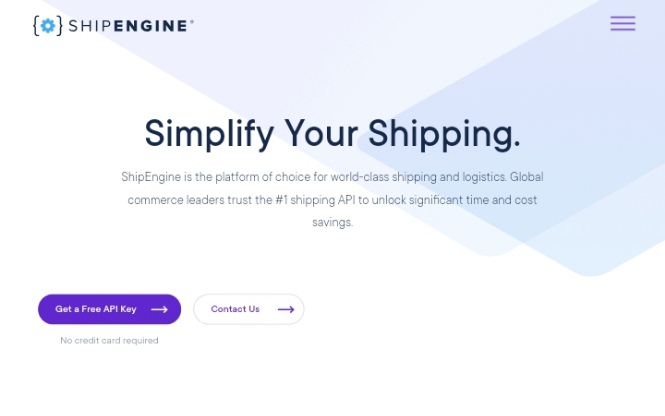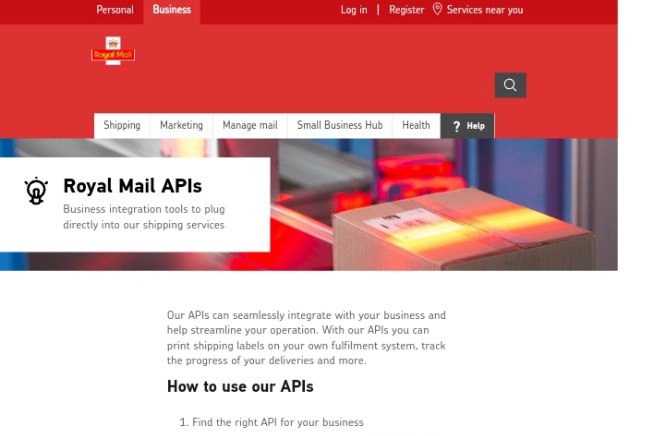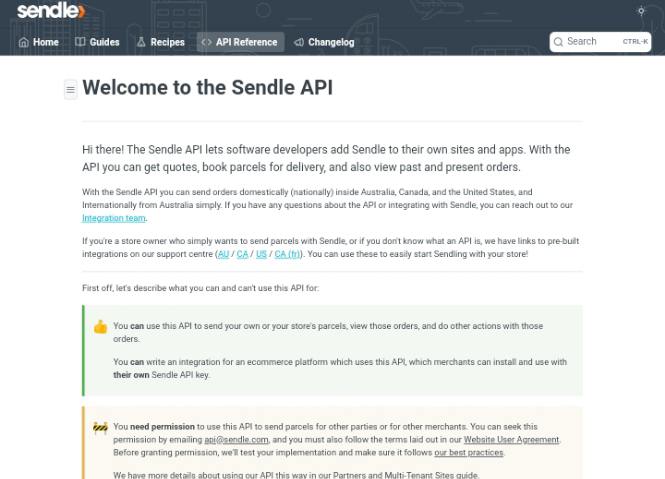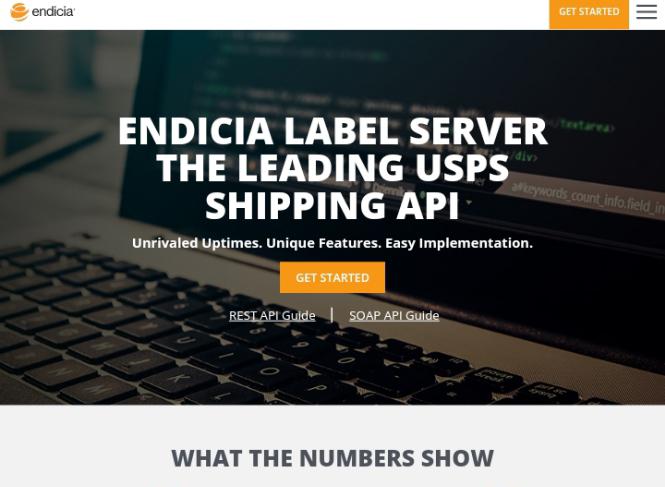Meeting client demand in today’s e-commerce environment entails being as efficient as possible and offering them a frictionless buying experience.
Having all of your shipping capabilities linked into your current tech stack allows your staff to receive information faster, allowing them to give the greatest customer experience possible.
To enjoy these tech capabilities, you need to choose the best shipping API. In this post, we’ll take a look at the 15 best shipping APIs for businesses. This post is packed with helpful insights so try to read it to the end.
Table of Contents
WHAT IS A SHIPPING API?
Shipping API means Shipping Application Programming Interface. To fully understand what we mean by a shipping API, you must first understand that an API is essentially code that lets various web apps communicate and transfer data to one another.
Therefore, a shipping API is a code that you can integrate and customize in your present tech stack to communicate and access shipping capabilities across many apps.
Shipping APIs enable organizations to incorporate all of the benefits of shipping software directly into their existing e-commerce technology stack. Programmers can help you integrate shipping services directly into your company processes or eCommerce website, providing you with greater flexibility using Shipping APIs
You can customize the Shipping API to particular company requirements and shipping carriers to boost fulfillment. It is a connection type that enables an eCommerce company to combine its online store, warehouse management system, or order management system with better shipping capabilities. This helps to streamline portions of shipping processes that are complex and time-consuming to arrange manually.
Assume that someone placed an order on your website. Instead of needing to use a separate application to compare shipping rates and print labels, you can get that functionality directly from your website thanks to the shipping API, which gathers data and functionality from one platform and displays the necessary information and capabilities for you in your current platform.
BENEFITS OF SHIPPING APIs?
1. Address Validation
Delivery failures or delays, as well as address changes, can have a negative influence on your brand’s reputation. Shipping APIs enable address validation, ensuring that packages are always delivered to the correct destination.
2. Track Orders
Sometimes, a surge of orders can overburden e-commerce enterprises. With simple manual methods, you may pay for several shipping labels for the same order or lose track of a specific order as it moves through the fulfillment process on your 3PL platform.
Orders placed on your site are synced to the fulfillment center’s 3PL platform, which is also synced to the shipping program that generates the labels via a shipping API.
This means you can see and track the actual location of your orders throughout the fulfillment process without switching between too many programs. This not only assists inventory managers, but it may also assist your customer support team in answering any questions about the status of your customers’ orders.
You Might Like: 21 Best Websites to Sell Stuff Online
3. Avoid Cart Abandonment
Cart abandonment issues affect the majority of eCommerce firms today. A significant proportion of these purchasers who quit their carts during the checkout process do so due to a difficult or poor delivery experience, or simply because of the cost of shipping.
Long, perplexing payment and delivery processes will inevitably frustrate customers and lead to cart abandonment. Shipping APIs can protect clients from abandoning their carts by delivering the finest shipping services and rates from different shipping carriers to fit every customer’s specifications and budget.
4. Real-time Rates And Tracking Options
Before and after a purchase, any business owner must ensure that they supply the most accurate and up-to-date information. Integration of Shipping APIs gives you and your purchasers with real shipping rates from a variety of carriers, allowing consumers to choose their preferred delivery method based on shipping rates and desired services.
APIs can assist in tracking deliveries across many carriers and in informing clients of delivery status. Allowing your consumers to select the delivery alternatives that best meet their needs, as well as providing them with transparent tracking information, adds value to your company and creates loyalty.
5. Capabilities For Many Carriers
The ability to tailor shipping services and carriers to your individual needs will improve your company’s performance and productivity. When it comes to shipping carriers, there are several options accessible, each with its own set of advantages. FedEx, for example, is well-known for its rapid deliveries and one-day shipping options.
UPS, on the other hand, has a significantly larger international footprint with exceptional shipment tracking capabilities, whereas USPS is best recognized for its low-cost services.
As a result, being able to operate with numerous carriers is advantageous as an online supplier. Shipping APIs allow you to access data and create shipping labels by allowing information to be sent between many sources.
WHO NEEDS THE SHIPPING API IN THEIR BUSINESS
A shipping API can be a valuable tool for eCommerce companies, allowing them to streamline operations and enhance productivity. A shipping API has been used to great effect by several successful eCommerce enterprises.
Amazon, for example, can give customers real-time tracking information and expected delivery dates by utilizing UPS APIs. This enables Amazon to provide a consistent customer experience, which is a significant competitive advantage.
Similarly, eBay uses FedEx APIs to provide tracking information and estimated arrival times to customers. This increases buyer trust and produces a great user experience. These companies have gained a competitive advantage and improved their bottom line by utilizing a shipping API.
BEST SHIPPING API FOR BUSINESSES
The following are some of the best shipping APIs for your businesses:
1. ShipEngine

ShipEngine is a well-known online shipping service provider with a powerful shipping API. The API can assist you in managing small to large shipping management workflows as well as the complete order fulfillment process.
This API connects over 30 shippers into your shipping program, allowing you to effortlessly authenticate your clients’ addresses or obtain shipping cost information with a single click.
ShipEngine API provides a variety of functions such as estimating shipping costs, printing labels, validating addresses, tracking parcels, pricing comparison, and much more. The API assists you in streamlining your eCommerce business’s whole shipping management system.
The API allows you to easily identify the lowest rate offering shipper to your customer’s address and save a lot of money. Also, give your consumers the finest tracking experience possible because the API gives real-time package status, accurate position, and unique branding.
2. Shippo API
The Shippo API is another trustworthy and dependable example of an eCommerce shipping API. It enables you to quickly begin shipping and delivery by simply connecting your systems to its API and initiating product delivery.
You may quickly eliminate many processes between your customer making an order and package delivery, such as searching for a suitable carrier, negotiating pricing, integrating carriers, printing labels, and so on.
Shippo API is appropriate for a variety of enterprises that require online shipping services, including logistics providers, eCommerce websites, online marketplaces, and shops. If you are a small online business, you can select the basic API, which includes key functionality such as shipping labels, address confirmation, tracking, and refund labels.
Professional and Premier plans are best suited for high-volume orders and major eCommerce websites. However, if you’re just starting, you can start with the Starter package and take advantage of various free services.
3. FedEx
FedEx is well-known for its overnight delivery services, as well as its effective system for tracking parcels and providing e-commerce retailers with real-time position updates. The FedEx Shipping API provides the information required to link a third-party application with the FedEx platform.
FedEx provides courier tracking APIs for integrating FedEx Express, FedEx Ground, and FedEx Freight into any eCommerce firm, retail website, or order management system. APIs can be obtained at a reasonable cost. FedEx also provides an Open Ship API and a Parcel Request API for creating shipments and managing courier pickups.
You Might Also Like: 10 BEST SHOPIFY APPS FOR DROPSHIPPING
4. USPS Web Tools
USPS Web Tools is a shipping API that allows you to use your software systems to access the shipping services of the United States Postal Service. This API provides real-time shipping costs, tracking data, and delivery notifications.
It also includes capabilities such as address validation, which can help ensure that your products are delivered to the correct place.
5. EasyPost
EasyPost is another popular online shipping app solution provider that has created a great shipping API to meet the needs of flexible shipping. Because the API is scalable, it is excellent for modest household brands, local online delivery firms, online marketplaces, fulfillment facilities, and corporations.
The API may be readily integrated into your shipping management system by a developer. You also just need to integrate it once, saving you a lot of money that you would have spent on an in-house developer, which is especially beneficial if you manage a small online business.
EasyPost API is compatible with over 100 domestic and international carriers. It aids with the printing of shipping labels, tracking of packages, estimating shipping costs, address verification, and other shipping management operations.
The API includes rate comparison across a list of carriers as well as cost-effective shipping insurance discovery. EasyPost provides two pricing tiers: Developer and Enterprise.
6. Royal Mail

The Royal Mail Shipping API provides a variety of services that businesses can use to integrate shipping capabilities into their websites and systems. Creating and managing shipping labels, tracking package progress, calculating postage charges, and validating addresses are just a few of the essential operations.
Furthermore, the API allows for the creation of customs documentation for international shipments as well as the direct printing of shipping labels. The API is also designed to be scalable and capable of handling a huge number of requests, making it suitable for businesses of all sizes. The API offers a variety of shipping options, including first-class, second-class, international, and special delivery.
7. ReachShip API
ReachShip’s Multi-Carrier Shipping API gives you access to shipping prices from a variety of industry giants, including DHL, UPS, USPS, FedEx, and Australia Post’s MyPost Business, with many more shipping carriers on the way. It contains several features that will assist you in organizing your shipping activities more efficiently.
This robust API manages your entire shipping workflow, from ensuring that the addresses provided by customers are correct using address validation, comparing shipping rates, creating shipping labels, and sending tracking updates to customers, to ensuring that their items are delivered to the correct location.
When compared to other options, this is one of the most effective ways to optimize your shipping process because it only requires you to pay the direct shipping provider’s shipping expenses.
8. DHL
DHL is a German-based multinational courier and rapid mail service. It is a robust shipping API. To save time, the DHL API is extensively defined and simple to integrate with any brand’s website and mobile applications. The nicest thing about DHL APIs is that they are completely free.
Some of the distinct features provided by DHL e-commerce logistics APIs include label design, tracking in real-time, and tracking status. Users can use the location finder to locate all DHL service sites where they can send and receive shipments and calculate government taxes and fees for international shipping.
9. Pitney Bowes API
Pitney Bowes Parcel Services API enables you to connect USPS and other shipping services to your website rapidly, generate regular shipping manifests to improve the workflow, handle returns and cancellations, and much more.
This shipping API can validate shipping addresses as well as search the USPS address database. If the API is unable to detect the entered address, it will provide alternatives.
The various shipping rates and expected arrival times are updated in real-time, allowing you to compare and choose the best option. You may trace the delivery status of packages using the Tracking API from the time they leave the warehouse until they arrive at their destination.
10. Sendle

Sendle has an amazing Shipping API and delivers small packages throughout the United States, including Alaska, Hawaii, Puerto Rico, and the United States Virgin Islands.
Sendle now allows you to send internationally from the United States to over 180 countries. A modest parcel can be shipped for as little as $3.95 inside the United States. There are no contracts or monthly costs.
Although Sendle does not provide rapid shipping, packages are often delivered between one to five days when using Sendle Preferred. Sendle’s free interfaces with Shopify, eBay, WooCommerce, and Etsy make it simple for even low-volume e-commerce firms to use its shipping.
You Might Also Like: 10 Best Scheduling Software For Business
11. ClickPost
ClickPost is a prominent multi-carrier shipping API integration platform that assists eCommerce firms in growing and retaining consumers. It offers a wide choice of courier APIs to swiftly integrate with courier partners in just one day.
ClickPost offers e-commerce companies a single API for managing all order manifestation and shipping procedures and obtains real-time tracking updates and sends them to consumers using push-and-pull API interfaces.
ClickPost also assigns the best carrier for packages based on historical performance, package type, delivery location, and other important factors.
12. Uship
Uship is an online marketplace where shippers and customers may connect. Businesses can add this functionality to any third-party website using its developer API. This international Shipping API is simple to use because it is well-documented. Uship saves you money by providing free courier API interfaces.
With Uship’s shipping API, you can Instantly obtain shipping quotes based on merchandise, integrate shipping costs by offering a simple and low-cost shipping solution, and automate the pickup, delivery, and billing processes. It also has API features for global shipping to various countries.
13. ShipBob
ShipBob shipping API is ideal for e-commerce enterprises that require logistics assistance. It provides a comprehensive range of e-commerce logistics services. It will also handle storage and inventory management.
Furthermore, because ShipBob has secured bulk discount prices with the four major carriers, small businesses may spend less for shipping through ShipBob than they would on their own.
ShipBob’s e-commerce software is free, and it integrates with several popular e-commerce platforms and marketplaces, including Walmart, eBay, Shopify, WooCommerce, Squarespace, Wix, and others.
You will pay a one-time implementation fee to sign up after receiving a quote from ShipBob. ShipBob will also charge you to receive your inventory (e.g., $25 per person per hour for the first two hours), warehouse your inventory (e.g., $5 per bin each month), and ship each order (discounted carrier rates, with free packaging after the first five orders). Shipping boxes are provided at no cost.
14. Endicia

Via its Shipping API, Endicia, a shipping and mailing service provider, can produce shipping labels, track shipments, and calculate shipping rates. The API also allows you to create customs documentation for foreign shipments and print shipping labels directly from the API.
Businesses can also utilize the API to automate their shipping processes by integrating with existing systems such as an e-commerce platform or a warehouse management system. Endicia not only provides a range of shipping options, such as Priority Mail, First-Class Mail, and Parcel Select, but it also allows businesses to buy and print postage directly from the API.
15. ShippyPro API
ShippyPro provides a sophisticated shipping API that automates shipping procedures for eCommerce companies. It allows businesses to interact with several shipping providers, compare pricing, print labels, and track deliveries in real-time.
All parts of shipping and return processing may be managed from a single location using the API. All of your orders’ shipping details are imported straight from your sales channel, allowing you to quickly and easily select the most cost-effective shipping provider.
Shipping may be simply integrated into any eCommerce website using the ShippyPro API. This allows business owners to optimize and automate their procedures while focusing on growing their companies.
ShippyPro allows you to manage shipments, track deliveries, give refunds, and expand your business into new areas.
You Might Also Like: 10 Awesome Chatbot Benefits for Your Business
FAQS
What is the process of shipping integration?
Shipping integration software is a solution that connects users’ shipping systems to their e-commerce platforms. This program allows for automated order fulfillment, shipment tracking, packing slip printing, and other e-commerce shipping solutions. APIs are used for the majority of shipping integrations.
How does the courier API function?
A shipping API retrieves user data from the account or the checkout page. This information is then used by the API to initiate order creation requests with the carrier. When the request is accepted based on your parameters, the API will provide the AWB number to the customer.
What exactly is a shipping API?
A shipping API is a sort of programming that integrates into your present tech stack, allowing you to reap the benefits of shipping software without leaving your current apps or manually transferring data.
CONCLUSION
Using shipping APIs is very beneficial but to get the best out of these shipping APIs, you must choose one that meets all your needs. Choosing a shipping API that doesn’t suit your demands might just bring more troubles than benefits.
We hope you found this post as insightful as promised. Feel free to share your thoughts in the comment section below.
If you liked this article, then please subscribe to our YouTube Channel for videos. You can also find us on Twitter and Facebook.
REFERENCE
- https://elextensions.com
- https://geekflare.com
- https://www.clickpost.ai
- https://bluewhaleapps.com